MEMPHIS SOARS
The most entertaining musical of the year is not a great musical. Here is a show with a predictable, synthetic feeling book and 19 songs which only emulate the music of the 1950s (they sound more like cover versions of the great anthems of the period than great Broadway tunes). But director/choreographer Edgar Godineaux, in the tradition of Fosse, is that rare breed in the theater: a magician who can turn a sow’s score into a silk production. No, not silk. Golden. This is one of the most energizing and inspiring productions in memory, actually, and puts to shame the all shook up in-your-face national tour.
Courtesy of Musical Theatre West, the high-octane Memphis blew into the Carpenter Center, giving us a romping, stomping celebration of rhythm and blues and rock ’˜n’ roll during its turbulent early years. The rocket blast of energy emanating from the stage is a nuclear combination of a phenomenal cast, Darryl Archibald’s smokin’ hot band, and Godineaux’s 1000-kilowatt dancers, who execute the infectious moves with the kind of unbridled joy that substantiates the healing capabilities of art. The instantly timeless choreography takes a bit from Sergio Trujillo’s original work, tosses in some Broadway, Rock ‘n’ Roll, and MGM Musicals and adds enough barrel turns and jump splits to leave you screaming for more.
The 2009 Broadway musical (which had zero competition and won Tonys for book and score) centers on a young white male named Huey Calhoun, an illiterate doofus who falls in love with black music (Huey is likeability personified by Michael Monroe Goodman, who I saw kill it as Jerry Lee Lewis in Million Dollar Quartet in Chicago; he does a yeoman’s job in a demanding role that puts him on stage for almost the entire show).
Battling the racism of Memphis during the early ’50s, Calhoun rises from local DJ to concert promoter, a blend of Alan Freed and Dick Clark. Calhoun falls for a young black singer named Felicia Farrell (powerhouse Krystle Simmons), whose overprotective brother Delray (Michael Shepperd, always engaging), an all-black small club owner, knows their interracial relationship could be hazardous to their health back in the segregated postwar era in Memphis.
The love affair between Huey and Felicia is difficult to accept, especially from Felicia’s side, but that’s how Joe DiPietro wrote the book so that’s what the audience is stuck with. (Felicia’s verbal blast about life on the black side of the color line is the most honest moment in the book.) But neither this nor the ensuing plot dampens a miracle production. This cast makes it heartfelt.
The familiar trajectory of the Huey-Felicia relationship isn’t the only cliché in the show: Huey’s mother Gladys (Julie Cardia) starts off as a low class racist (“She ain’t nothin’ but a colored girl”), but by the second act she has seen the light of racial harmony, belting out a hip-swiveling gospel solo, “Change Don’t Come Easy,” as blatant an audience pandering number as any on record. But this cast makes it accessible.
Then there is Gator, a bartender at Delray’s who has been a mute since the age of five, when he was traumatized by watching his father being lynched, but when Gator (Kenneth Mosley) breaks out of his silence in time to lead the first act finale in “Say a Prayer,” it’s a rather silly manipulation. Jay Donnell plays Bobby, a black janitor at Huey’s radio station who turns out (surprise, surprise) to have great rhythm and blues singing chops. But this cast makes you buy it all.
I’m not sure Ella, Frank, Elvis or the the Beatles could make these songs memorable. David Bryan (keyboard player of Bon Jovi) wrote the music and lyrics, which superficially recreate the sounds of R&B and first generation rock, but there is nothing original in the score and nothing the audience can take with it out of the theater, with the possible exception of the rousing “Everyone Wants to Be Black on a Saturday Night.”
While the warm-and-fuzzy contrived ending (an onstage reconciliation at a Felicia concert by everyone in the cast) won’t have you feeling as giddy as the end of Act I, it doesn’t matter: the biggest upside in Memphis resides in the chorus, full of exuberance and stamina as they jive through Godineaux’s animated, rock ’em sock ’em choreography.
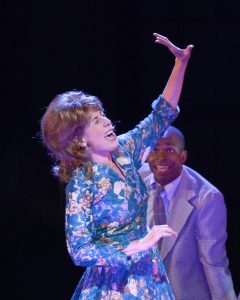 photos: Caught in the Moment Photography
photos: Caught in the Moment Photography
Memphis
Musical Theatre West
Richard and Karen Carpenter
Performing Arts Center
Cal State Long Beach
ends on November 6, 2016
for tickets, call 562.856.1999 or visit Musical
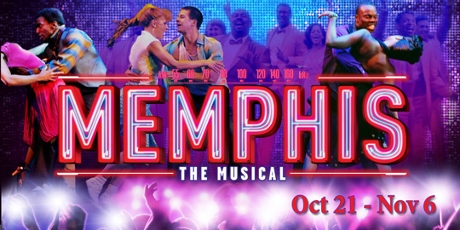
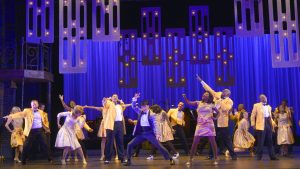
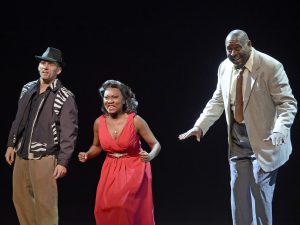
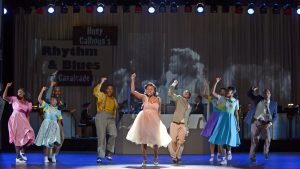
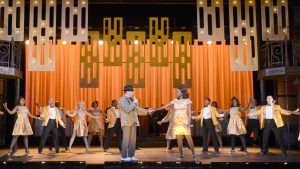
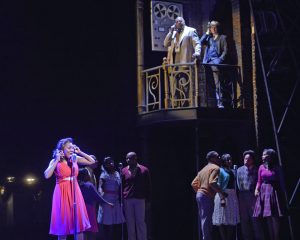
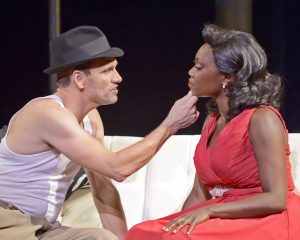
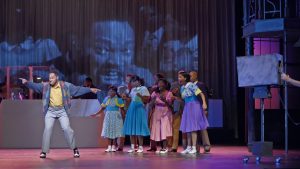
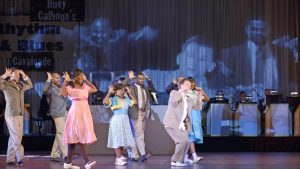
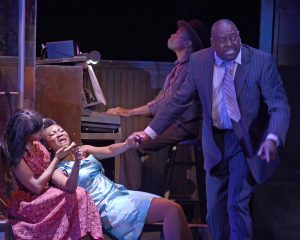
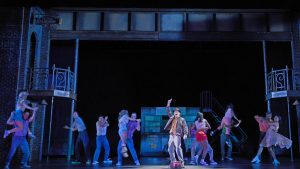
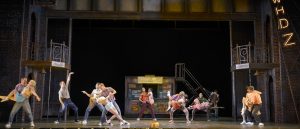
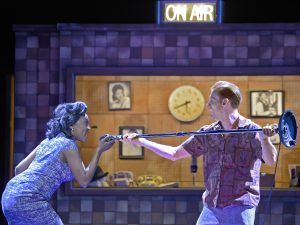
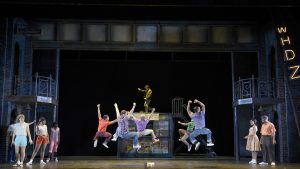
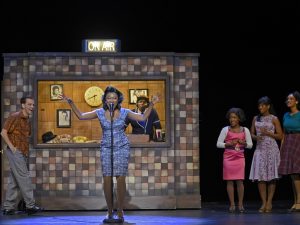
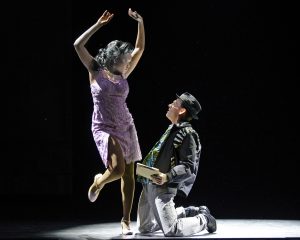
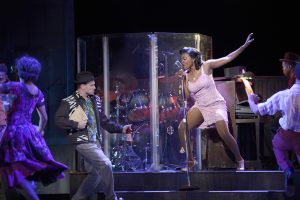
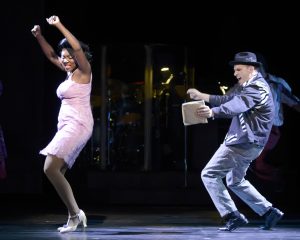
{ 1 comment… read it below or add one }
I saw the production in Long Beach and thought it was great. Just left the production at the Broward Center in Fort Lauderdale, FL, and it was spectacular. Huey was authentic. All the singers were great. While both productions were compelling, the Broward production was more enjoyable.